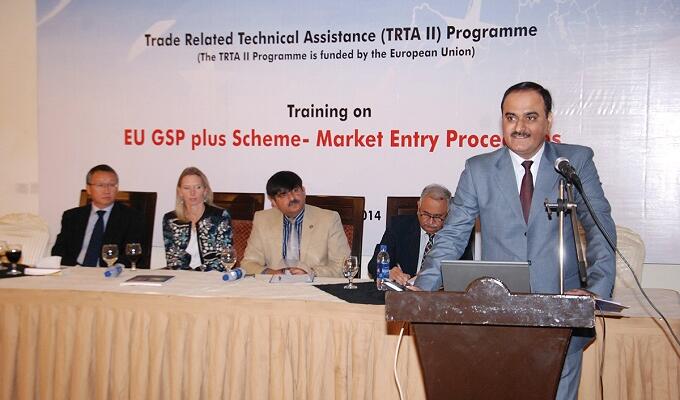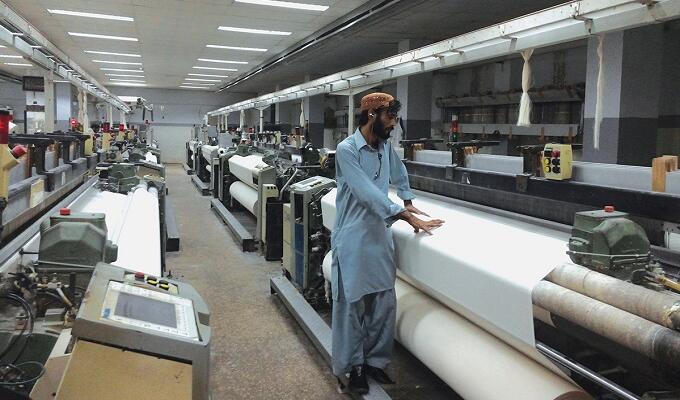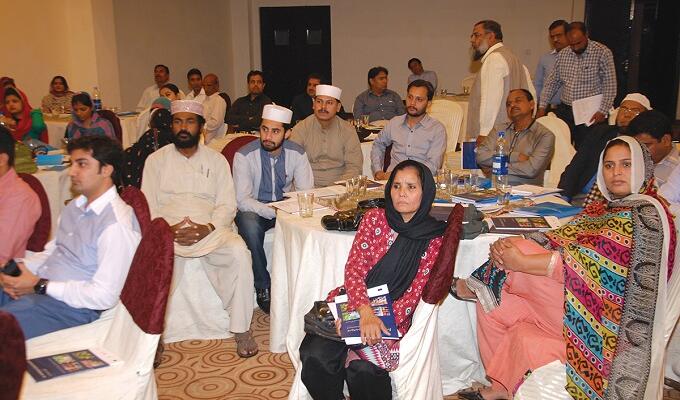



Guidebook, training help Pakistani SMEs use EU trade preferences (en)
At the start of 2014, the European Union (EU) accorded Pakistan enhanced market access concessions that went beyond the general trade preferences Brussels offers to developing countries.
It became clear, however, that many companies in Pakistan were struggling to take advantage of the new trade opportunities. The enhanced preference scheme lowers tariffs on several products, but compliance with non-tariff measures, including proof of origin requirements, remains mandatory.
Understanding those requirements, not to mention complying with them, is particularly difficult for small and medium-sized enterprises (SMEs) and new exporters. Unless more companies understand how the new tariff rates apply to their products and what they need to do to comply with non-tariff measures and documentation requirements, improved access to European markets will fall short on its potential to deliver broad-based economic and developmental benefits in Pakistan.
‘While exports from Pakistan to EU have increased considerably since Pakistan received GSP+ status, there is room for further enhancing exports by bringing new enterprises into the business of exporting,’ said Arif Anwer Baloch, the state of Punjab’s secretary for industries, commerce and investment.
ITC prepared a guide based on consultations with multiple stakeholders in Pakistan, spelling out how Pakistani companies in key export sectors can boost sales and employment by taking advantage of the EU’s Generalized System of Preferences-Plus (GSP+) scheme. Published in October 2014, the guide is available online free of cost in both English and Urdu and has been accompanied by training workshops for companies, government officials and business groups.
Feedback from exporters has been positive. ‘I had heard about the GSP+ scheme but it was never clear to me how to benefit from it,’ said Rukhsana Zafar, founder and chairperson of Neudom International, a firm specializing in hair- and skin-care products. ‘I am grateful to ITC for providing us such a wonderful guide to address our information needs.’
‘The Urdu version would allow a very wide readership and thereby a greater possibility of increasing the number of exporters to the EU,’ added Azher Ali Chaudhry, additional secretary with the national Ministry of Commerce. ‘I am sure that a new class of exporters will emerge taking the benefit of the guidelines and thereby contribute to job creation and poverty alleviation.’
The new report explains what exactly GSP+ status entails for Pakistani exporters and outlines the procedures to be followed at home to export to the EU under this scheme.
For companies in key export sectors for Pakistan – clothing, footwear, fruits and nuts, ethanol and dairy – the guide sets out step-by-step instructions for how to use the scheme. It explains how would-be exporters must go about finding their products’ tariff classification under the EU’s Combined Nomenclature (CN) system. It then explains how to determine the correct preferential rate, origin criteria, regulatory requirements, labelling and licensing rules, and documentation requirements in both Pakistan and the EU.
‘The guide book and training on EU GSP+ scheme were both effective steps forward towards addressing the information requirement of businesses at large,’ said Qaisra Sheikh, a director at General Machines, which makes packaging machinery. ‘Pakistani businesses are in dire need of such initiatives to take advantage of [the] GSP+ scheme up to its maximum potential.’
Naveed Farooki, director of Ecko Textiles Pvt Limited and a member of the managing committee of the Karachi Chamber of Commerce and Industry, described the guide as ‘a perfect lexicon to understand the market, conventions and trade of the EU.’ He believes it will be useful ‘not only for the exporters who are exporting to the EU, but also for the exporters who are looking forward to export to the EU.’
With the new guide, ITC’s GSP-related work with Pakistan came full circle: ITC previously worked with Pakistan to help it secure GSP+ status, commissioning assessments of what Pakistan needed to do to meet the eligibility criteria and building public and private sector awareness of the potential benefits of expanded market access to the EU.
ITC developed the GSP+ guide within the context of a programme being implemented in Pakistan by ITC, the World Intellectual Property Organization and the United Nations Industrial Development Organization.
The guide builds on years of ITC work with Pakistan to improve public-private dialogue in formulating trade policies and build institutional capacity to help businesses navigate non-tariff measures in export markets.
The EU’s regular Generalized System of Preferences (GSP) scheme offers developing country exporters reduced tariffs across roughly two-thirds of EU tariff lines. The GSP+ variant grants additional tariff preferences to developing countries that have adopted 27 international conventions relating to sustainable development and good governance.
GSP+ preferences are extended to some 13 developing countries including Pakistan. They cover key developing country exports such as certain agricultural and fisheries products, tobacco, chemical products, plastic, rubber, raw hides and skins and leather, wood, textiles, apparel, footwear, and articles of stone.



